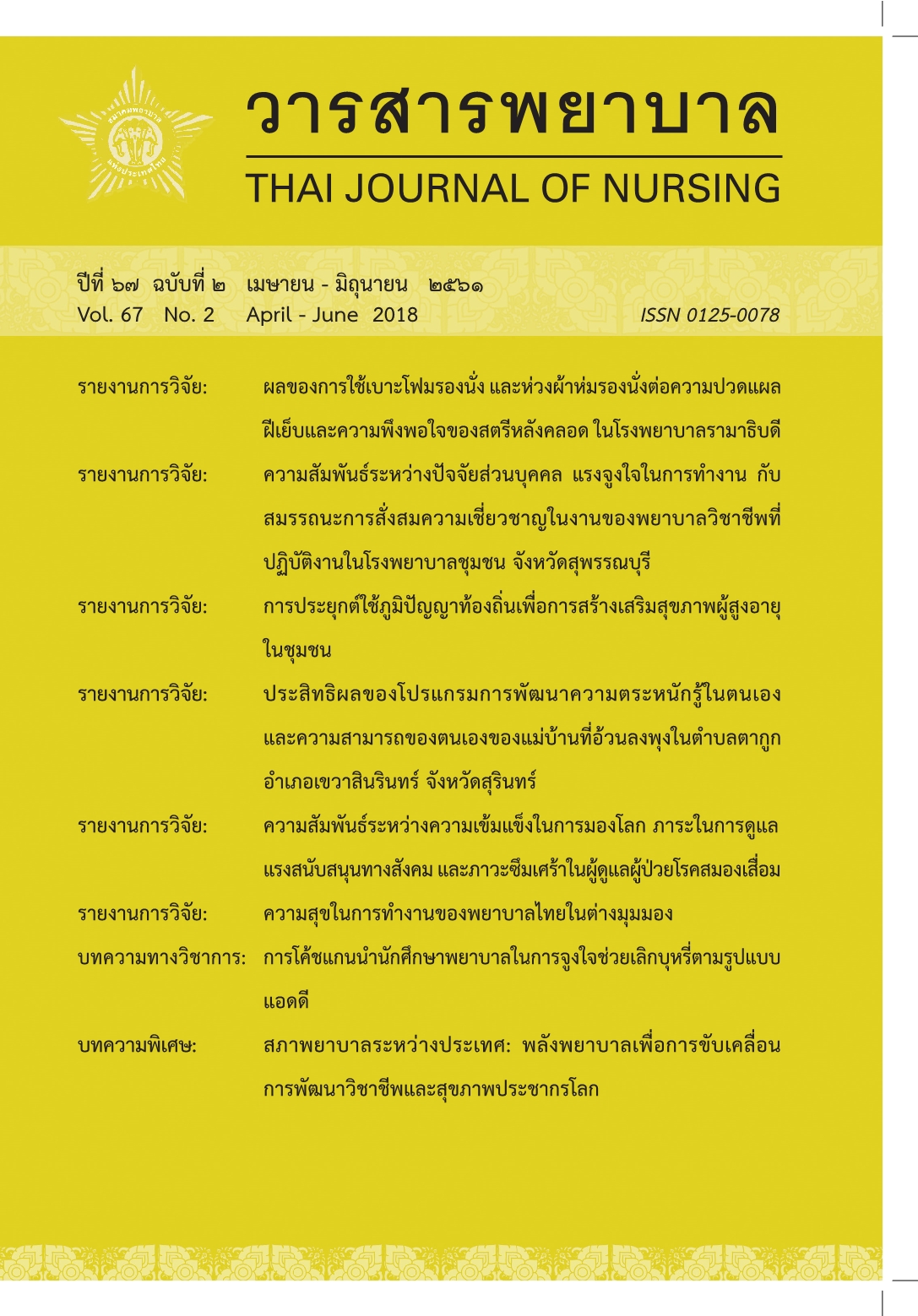The effects of using the foam mattress and the blanket torus on perineal pain and satisfaction in postpartum women at Ramathibodi Hospital
Main Article Content
Abstract
This quasi-experimental study aimed to compare perineal pain and satisfaction between using the foam mattress and the blanket torus in postpartum women at Ramathibodi Hospital. The sample of 30 postpartum women was purposively selected. Research tools consisted of numerical pain scales and satisfaction questionnaire. The Cronbach alpha coefficient of satisfaction questionnaire was 0.82. Mean, standard deviation and t-test were used in data analysis. The results of this study showed that there was no significant difference in perineal pain between postpartum women who used the foam mattress or the blanket torus at p >.05. After using the foam mattress or the blanket torus, perineal pain was significantly decreased from pre-experimental period at p< .001. The postpartum women who used the foam mattress had higher satisfaction in total and in the subscales of benefit and easy using than those who used the blanket torus at p <.05.
Article Details
References
เจ็บปวดในผู้ป่วยที่มีแผลผ่าตัดริดสีดวงทวารหรือผู้ป่วยที่มีแผลฝีเย็บ. วารสารโรงพยาบาลอุตรดิตถ์,
26(2), 149-157.
Achariyapota, V., & Titapant, V. (2008). Relieving perineal pain after perineorrhaphy by diclofenac
rectal suppositories: A randomized double-blinded placebo controlled trial. Medical Journal of the
Medical Association of Thailand, 91(6), 799-804.
Chou, D., Abalos, E., Gyte, G. M. L., & Gulmezoglu, A. M., (2010). Paracetamol /acetaminophen
(single administration) for perineal pain in the early postpartum period. Cochrane Database of
Systematic Reviews. Retrieved May 2, 2015, from https://onlinelibrary.wiley.com/doi/10.1002/
14651858. CD008407.pub2/pdf/standard
Cohen, J. Z. (1998). Statistical power analysis for the behavioral sciences (2nd ed.). Hillsdale, NJ:
Lawrence Erlbaum Associates.
Hedayati, H., Parsons, J., & Crowther, C. (2003). Rectal analgesia for pain from perineal trauma
following childbirth. Cochrane Database of Systematic Reviews. Retrieved May 2, 2015, from
https://onlinelibrary.wiley.com/doi/10.1002/14651858.CD003931/pdf/standard.
Laws, P., & Sullivan, E. A. (2009). Australia's mothers and babies 2007. Sydney: Australian Institute
of Health and Welfare National Perinatal Statistic Unit.
Leeman, L. M., Roger, R. G., Greulich, L. L., & Albers, L. L. (2007). Do unsutured second-degree
perineal lacerations affect postpartum functional outcomes? Journal of the American Board of
Family Medicine, 20(5), 451–457.
Macarthur, A. J., & Macarthur, C. (2004). Incidence, severity, and determinants of perineal pain after
vaginal delivery: A prospective cohort study. American Journal of Obstetrics & Gynecology,
191(4), 1199-1204.
Rogers, R. G., Borders, N., Leeman, L. M., & Albers, L. L. (2009). Does spontaneous genital tract
trauma impact postpartum sexual function? Journal of Midwifery and Women's Health, 54(2),
98–103.


